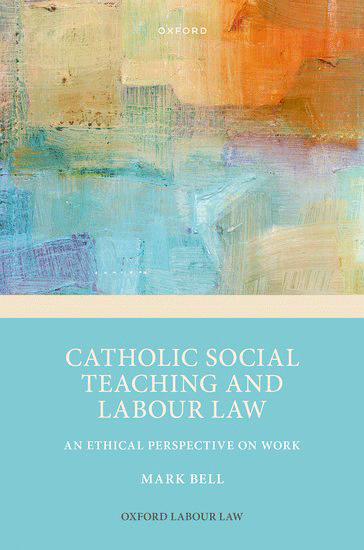Catholicism and capitalism
Catholic Social Teaching and Labour Law: An Ethical Perspective on Work
Mark Bell
£90, Oxford University Press
★★★★✩
At 5am on 20 September 1870, an artillery barrage commenced. Its target was the ancient walls of Rome at Porta Pia. Old as the walls were, it took three hours of shelling to make a breach, and then Italian troops poured in, led by the Bersaglieri (marksmen). Soon a white flag was hoisted over St Peter’s. The long reign of the papacy as a temporal power was over. It would take 60 years before even diplomatic relations were restored with the Kingdom of Italy.
In the years that followed the attack on Porta Pia, the Papacy – dispossessed of its temporal power – evolved. Out went reactionary pronouncements, such as the Syllabus of Errors that had brought forth an apoplectic reaction from Gladstone – a stalwart supporter of Catholic emancipation – and in came a willingness to address an entirely innovative approach to social problems affecting the then developing industrialised world. It is these pronouncements that form the subject matter of this book.
The public at large, even those that would still identify as religious, if not practising Catholics, may be surprised both at the notion that the church has anything to do with workers’ rights, and at the extent of the corpus of writing coming from it that amounts to an ethical critique of the relationship between capital and labour.
Guiding the reader through a series of encyclicals – letters addressed to the Catholic world but not, at least since Pius XI’s Quadragesimo Anno, restricted to it – Professor Mark Bell charts the development of Catholic social teaching (CST) on workplace ethics, starting with Leo XIII’s Rerum Novarum of 1891.
Religion has taken an interest in work ever since the expulsion from Paradise. Social teaching on labour is not, as Bell emphasises, the exclusive preserve of Christian thinkers: Islam and Judaism both recognise its significance. Indeed, it was through Islamic scholars that the Christian world discovered Aristotelian philosophy. Aristotle (pictured above) was a major influence on priest and philosopher St Thomas Aquinas. Aquinas adopted Aristotle’s concepts of personal dignity through work, ideas that came back to life with Leo XIII. The dignity of the person, to be respected in all forms of human endeavour, including work, contrasted with Marx’s ideas of alienation. From the outset, CST sought to resolve, not sharpen, any conflict between capital and labour.

Bell uses EU labour law as a lens through which to view how far the theory set out in Catholic encyclicals has been translated into practice by the EU. He looks specifically at the concepts of the right to a just wage, the right to rest, worker participation, equality, and discrimination.
Each of those concepts has its own religious dimensions. The just wage concept is a theme found throughout the Bible. Modern ideas of the right to a minimum wage, though, can trace much of their traction to the work of Jack Ryan, a Harvard economist turned Catholic priest, who both advocated the ideas in Rerum Novarum and saw such ideas implemented in Roosevelt’s New Deal. The right to rest, and the right of worker participation, were present in CST long before they were crystallised in national legal systems. When it comes to support for and recognition of collective rights, CST in Laborem Exercens could be seen to have adopted ideas that favour trade union rights to a much greater degree than our own domestic legislation, particularly since the Strikes (Minimum Service Levels) Act 2023.
Bell rightly does not shy away from the potential friction in CST when it comes to discrimination on the grounds of sex. Early encyclicals were of their time and endorsed the then current notions of the role of women (in the home) and men (in the workplace). Similar concepts did inform decisions of the European Court of Justice, see for example Hofmann v Barmer Ersatzkasse [1984]. However, the ECJ has gone on to endorse a broader idea of parental responsibility, not predetermined by sex, in Roca Álvarez v Sesa Start España ETT SA [2010].
The contrast and congruences between CST and EU law might be thought to restrict the value of Bell’s work to English-speaking EU citizens, whether in Ireland or elsewhere. It does not. As well as proving a highly persuasive account of the development of certain labour rights (which remains relevant to the British reader as part of assimilated EU law), this approach helps illustrate the need (and sometimes the difficulties) of converting broad ethical principles into workable laws.
However, EU law, as understood by decisions of the ECJ, tends to be illustrative of broad general principles. Those from a common law jurisdiction may seek more practical examples of ethical issues as they appear in the workplace. But to do this would mean looking at, for example, the decision of only one jurisdiction rather than the overriding view from Luxembourg.
Those who are not familiar with CST but are familiar with EU law may be surprised to know that at least two of the basic building blocks of the former have been directly transposed by the latter: solidarity and subsidiarity. That too leaves the interesting question open as to whether the third basic principle of CST, the dignity of the person, is a better basis upon which to build discrimination law than the usual comparative exercise that appeared first in CST.
It would be helpful to put CST in context. The Catholic Church might be thought to be outside politics, recognising that its role now is spiritual rather than temporal, but events influence the church just as they do any other corporation.
The French Revolution may have promoted liberty, equality and fraternity, but also executed anywhere between one to two thousand priests and members of religious orders. Pope Pius VI was to die following his incarceration by revolutionary forces. Consequently, the Papacy’s view of revolution and the rights of man (as that expression would have been understood at the start of the 19th century) was coloured by its experiences during that period. The benefits of organised labour and union power within civil society were generally clear to John Paul II: his support of Solidarność, the Polish trade union, endorsed major change in Polish society. How far CST was and is simply reactive to world events, being at best a nagging voice of moral conscience, or is itself a driver behind such changes, could have been developed by Bell.

Equally, does the concept of the dignity of the person constitute a self-sufficient concept that pre-empts the need for obligations to balance rights in the employment relationship?
Overall, though this is an important contribution to understanding workplace ethics from sources that should be better known outside narrow theological circles.
Max D Winthrop is a partner at Sintons LLP in Newcastle
































No comments yet